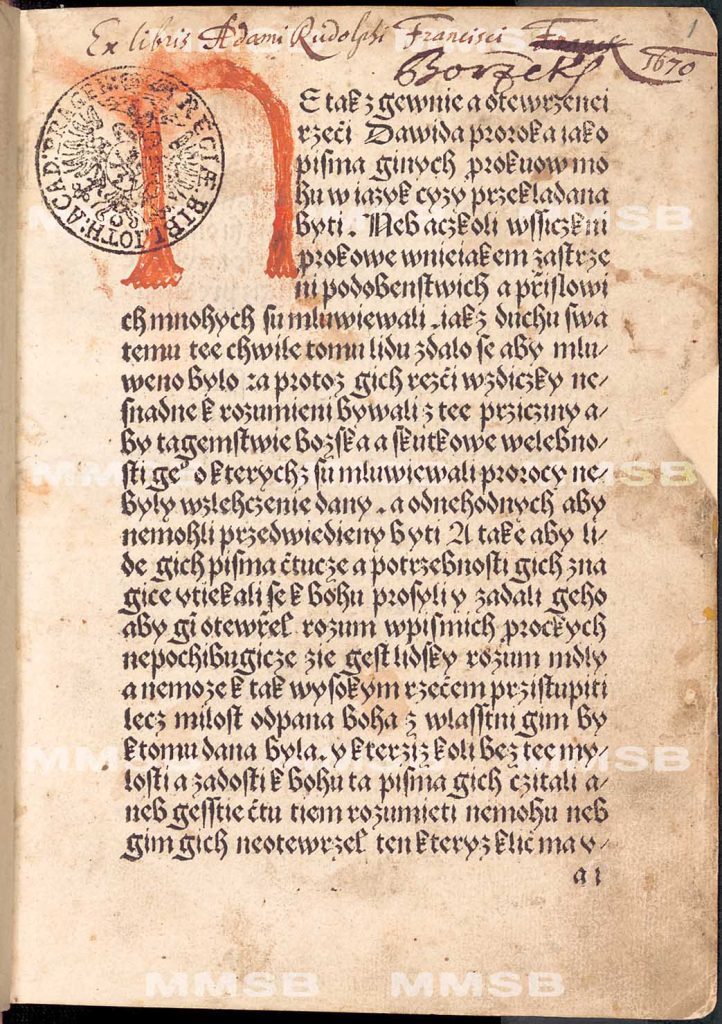| Author | unknown |
| Genre | Psalter, Religious |
| Keywords | 15th century, Book of Psalms, Old Czech Translation, Prologue |
| Title (in Czech) | [Předmluva ke Knize žalmů ve staročeských tištěných biblích] |
| Title (in English translation) | [Preface to the Book of Psalms in Old Czech Printed Bibles] |
| Editor | Andrea Svobodová – Kateřina Voleková |
| Translator | Andrea Svobodová – Sarah Gráfová – Jan Čermák |
| Edited source | Praha, Královská kanonie premonstrátů na Strahově, DP VI 16, ff. 1r-3v |
| Introduction | Andrea Svobodová – Kateřina Voleková |
| TEI P5 XML Encoding | Michal Mocňák – Ondřej Svoboda – Boris Lehečka – Ondřej Tichý |
| Summary of content | The text deals with the difficulties involved in translating the psalms. It outlines the problems of literal translation in comparison with interpretative translation, the latter of which aims to preserve aesthetic value and factual accuracy. |
Introduction to the Text
This preface to the Book of Psalms, beginning with the incipit Ne tak zjevně a otevřeně (Not as clearly and overtly), does not have a corresponding Latin model as most of the biblical prologues do, but is the original work of the author of a new (and the fourth) Czech translation of the Book of Psalms, indeed of the entire Bible, that was probably produced at the University of Prague in the 1480s. The text deals with the difficulties involved in translating this metaphorical poetic text. It outlines the problems of literal translation as against interpretative translation, the latter of which aims to preserve aesthetic value and factual accuracy. The prologue also attempts to defend the new Czech translation of the Psalter, which attempts to resolve some unclear passages based on the Latin version, Psalterium iuxta Hebraeos. Towards the end of his text the author informs the reader as to the title Psalter as related to the name of the musical instrument called the psaltery, and at the close he explains the function of the so-called tituli (headings) included before each psalm to briefly summarize the spiritual content of its text.
Regarding the authorship of the new Psalter translation, Josef Vintr (see Vintr 2012, section Further reading) ascribed this to Václav Koranda mladší (1425–1519), administrator of the Utraquist church and rector of what is now the Charles University. His attribution is based on the use of the Czech nevěrný as equivalent of the Latin adjective impius, which is typical in Koranda´s work (the three previous Psalter translations having used the word nemilostivý). However, Koranda´s participation in the new biblical translation does not seem very likely, taking into account the considerable amount of other work he was involved in (see Marek 2017, section Further reading). It is therefore possible to say in general that the translator would have been connected to the Utraquist or University environment, which has been identified through the usage of some words and religious terms differently from the way in which they were used in the previous, pre-Hussite period.
Introduction to the Source
The preface is found for the first time in the Žaltář první tištěný (First Printed Psalter, Praha) of 1487. Beside this, the text was included in entire biblical editions with the appearance of the new (fourth) translation: in the so-called Bible pražská (Prague Bible, Praha, unknown printer, 1488), Bible kutnohorská (Kutná Hora Bible, Kutná Hora, Martin z Tišnova, 1489) and Bible benátská (Venice Bible, Venice, Peter Liechtenstein, 1506). The preface also survived in one manuscript from the turn of the 15th and 16th centuries: Starý zákon obrovských písmen (‘Old Testament in Large Script’, Praha, Národní knihovna České republiky, XVII A 36), probably copied from the Kutná Hora Bible.
The preface to the Psalter was later in the revised version also included in Bibles of the 16th and 17th centuries: in those printed by Severin (1529, 1537), Melantrich (1549, 1556, 1560, 1570) and Veleslavín (1613).
About this Edition
This new translation is based upon the critical edition of the Old Czech Biblical Prologues (see Staročeské biblické předmluvy, 2019, section Existing editions), i. e. sources before 1500: the transcription of the First Printed Psalter version there is accompanied by the variants from the Prague Bible (siglum: BiblPraž), the Kutná Hora Bible (siglum: BiblKutn), the Venice Bible (siglum: BiblBen), and the Old Testament in Large Script (siglum: BiblObrSZ).
Existing Editions
Voleková, Kateřina and Svobodová, Andrea, editors. Staročeské biblické předmluvy [Old Czech Biblical Prologues]. Scriptorium, 2019, pp. 276–277.
Further Reading
Poleg, Eyal. A Material History of the Bible, England 1200–1553. Oxford University Press, 2020, pp. 43–47.
- an overview study on the General Prologue in the Wicliffite Bible with evidence of existing editions and literature
Marek, Jindřich. Václav Koranda Mladší: Utrakvistický administrátor a literát [Václav Koranda the Younger: Utraquist Administrator and Author]. Nakladatelství Lidové noviny, 2017.
- a monograph on Václav Koranda the Younger(c. 1425–1519), a representative of the third generation of Czech Utraquists
Vintr, Josef. Prvotisky českého žaltáře [Incunables of the Czech Psalter], in: Čeština v pohledu synchronním a diachronním: stoleté kořeny Ústavu pro jazyk český, eds. Světla Čmejrková, Jana Hoffmannová and Jana Klímová. Karolinum, 2012, pp. 179–184.
- a pilot study focusing on the Psalter translation version in Old Czech biblical incunables
